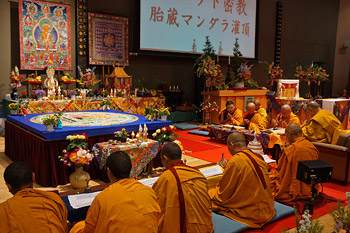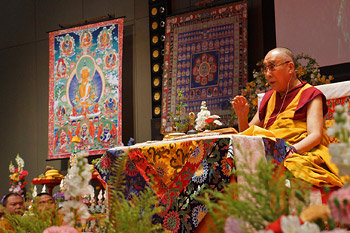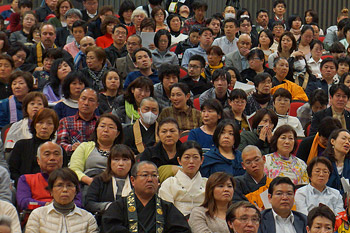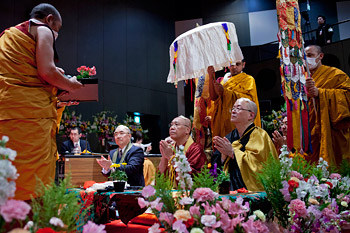Koyasan, Japan, 14 April 2014 - In contrast to yesterday, the weather this morning was bright as His Holiness the Dalai Lama walked to the Koyasan University Auditorium. He was to undertake the preparatory rituals for the Vairochana-abhisambodhi empowerment he was going to give.

|
His Holiness the Dalai Lama and monks from Namgyal Monastery performing Vairochana-abhisambodhi empowerment preparation rituals at the Koyasan University Auditorium in Koyasan, Japan on April 14, 2014. Photo/Jeremy Russell/OHHDL
|
He was supported by a team of monks from Namgyal Monastery, including the Abbot and Lopon, led by former Abbot Jhado Rinpoche. The team arrived earlier this month and worked over several days to create an elaborate sand mandala for the empowerment. This morning they sat with His Holiness chanting the self-empowerment and preparatory rituals accompanied by an elaborate array of mudras or hand gestures.
In the time that remained of the morning session, His Holiness gave a concise explanation of the ‘Eight Verses for Training the Mind’.
“As I said yesterday,” he began, “the awakening mind of bodhichitta is the main cause of Buddhahood. If you have bodhichitta, you will achieve Buddhahood. In the Heart Sutra it says that the Buddhas of the past, present and future rely on wisdom to become fully enlightened. If you have an understanding of emptiness but are motivated to achieve liberation that’s where it will lead, only if you have bodhichitta will it lead to Buddhahood. Bodhichitta has two aspects the wish to benefit others and the wish to achieve Buddhahood.
“Buddhahood is synonymous with omniscience, which is essential because if you don’t know what they need you could make a mistake and do them harm. And to achieve omniscience we need to overcome the obstructions to knowledge. Chandrakirti’s ‘Clear Words’ defines these as the latent potencies left by negative emotions. As long as these remain, dual appearance remains. All the Buddhas of the past, present and future have become enlightened on the basis of bodhichitta and the wisdom understanding emptiness.”
His Holiness reiterated that bodhichitta is indispensable for the achievement of enlightenment. But there is also no higher factor for achieving higher rebirth, because it naturally induces restraint from killing and other harmful actions which lead to lower rebirth. In his ‘Jewel Garland’ Nagarjuna extols the practice of exchanging self and others and Shantideva says there is no greater cause of happiness. Bodhichitta is the source of all that is good for ourselves and others. On the other hand, His Holiness said, the more selfish you are, the more you will distance yourself from others, seeing them in terms of ‘me’ and ‘them’.

|
His Holiness the Dalai Lama speaking during the morning session of his teachings in Koyasan, Japan on April 14, 2014. Photo/Jeremy Russell/OHHDL
|
The author of ‘Eight Verses for Training the Mind’, essentially a text about the practice of bodhichitta, Geshe Langri Tangpa, was one of the chief disciples of Geshe Potowa, who was one of the main disciples of Dromtonpa, the principal disciple of Atisha. His Holiness pointed out that the sense of the original Tibetan in each of the verses is to say deliberately ‘I will do this...’ or ‘I will do that...’ but when it is used as recitative text we tend to say ‘May I do this...’ or ‘May I do that...’ Beginning with the first verse His Holiness explained that cherishing others is about not looking down on them and regarding them as more important than you. It involves acknowledging that all worldly success comes about in dependence on other beings. Higher rebirth is achieved in dependence on other beings. Omniscience is achieved by relying on other beings. The question then is why we show the Buddhas respect, but not other beings. Chandrakirti says that compassion for sentient beings is both the seed and the harvest. Because sentient beings are kind to us, we should be grateful and cherish them as supreme.
Suggesting that we need to take account of how we exclude others through our use of language, he said:
“I tell myself that as a Buddhist monk, a follower of the Buddha, a follower of the pure authentic Nalanda tradition, if you are unable to cherish others, you should think of yourself as the lowest of all. “
It is because we cling to true existence and cherish ourselves that we are under the sway of disturbing emotions. Among those referred to negatively in the fourth verse, His Holiness suggested we could include people beset by serious illness. He said that he recently visited a leprosy clinic in Delhi where a Japanese called Sasakawa offers help and support to those afflicted by the disease.

|
Members of the audience at the Koyasan University Auditorium listening to His Holiness the Dalai Lama's teachings in Koyasan, Japan on April 14, 2014. Photo/Jeremy Russell/OHHDL
|
“These people are often stigmatized and face hostility, but as I told Indian officials there they are human beings, people like us, and yet they are cast out.”When someone insults you or behaves unpleasantly to you it is hard to be good to them in return, especially if you have already tried to help them. It is important to practise patience and you can be grateful to them for giving you the opportunity to do so. His Holiness explained that the description of the practice of exchanging self for others, ‘May I give all help to my mothers and may all their negativity ripen on me’ may not actually help them, but it builds your courage and self-confidence.
The final verse refers to not letting your practice be sullied by worldly concerns, such as a wish for praise and reward. The solution is to see things as like an illusion. His Holiness remarked that selflessness of persons was referred to in the first turning of the wheel of Dharma, but the Perfection of Wisdom teachings of the second turning of the wheel explain that phenomena are empty of intrinsic existence too. Because phenomena still appear to be intrinsically existent, even when you know they are not, regard them as like an illusion. This is to avoid clinging to that appearance which is the basis for the arising of emotions like anger and attachment. Ignorance pervades all disturbing emotions. By overcoming ignorance we will overcome all disturbing emotions. His Holiness concluded:
“This text by Langri Tangpa emphasizes the practice of bodhichitta. It would be good to memorize this and the text I explained yesterday, the ‘Song of Experience’ to be better able to apply what they teach in your day to day life. Now, it’s nearly midday and time for the food empowerment!”

|
Senior students receiving ritual blessings during the Vairochana-abhisambodhi empowerment bestowed by His Holiness the Dalai Lama in Koyasan, Japan on April 14, 2014.
Photo/Office of Tibet, Japan |
After lunch, His Holiness began by pointing out that the Mahayana consists of the Perfection Vehicle and the Vajra Vehicle. Following the Perfection Vehicle you cultivate the path, progressing through four paths to reach the fifth which is Buddhahood. In the Vajra Vehicle you cultivate the four pure states of Buddhahood - pure body, pure environment, pure resources and pure activity - in the present and follow the path. The Vajra Vehicle is cultivated in secret; it’s referred to as esoteric, because the Buddha taught it to a few select disciples. In some mandalas he appeared as a monk, but mostly he manifested as the lord of the mandala.
Mantra, His Holiness explained, can be understood as shielding the mind; shielding it from ordinary appearance.
He noted that the Vairochana-abhisambodhi empowerment belongs to the second class of tantra, Performance Tantra, that he received it from Ling Rinpoche in the Tsuglagkhang in Dharamsala and subsequently performed the retreat. At the end he remarked that the goal was to fulfil the temporary and ultimate purposes of all sentient beings and that what is important is to cultivate compassion and an understanding of emptiness.
With that he returned to his rooms in the Kongo-bu-ji temple nearby. Tomorrow he will return to the auditorium for a public talk and an opportunity for members of the public to ask questions, before travelling to Tokyo.